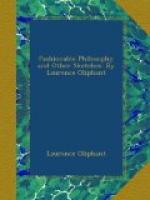a warm friendship that I gradually made the discovery
that this interesting man held views which differed
so widely from the popular conception of Buddhism
as I had known it in Ceylon—where I had
resided for some years—that my curiosity
was roused,—the more especially as he was
in the habit of sinking off gradually, even while I
was speaking to him, into trance-conditions, which
would last sometimes for a week, during which time
he would remain without food; and upon more than one
occasion I missed even his material body from my side,
under circumstances which appeared to me at the time
unaccountable. The Nepaulese troops were not
very often engaged with the rebels during the Indian
Mutiny; but when they were, the Guru was always to
be seen under the hottest fire, and it was generally
supposed by the army that his body, so far from being
impervious to bullets, was so pervious to them that
they could pass through it without producing any organic
disturbance. I was not aware of this fact at
first; and it was not until I observed that, while
he stood directly in the line of fire, men were killed
immediately behind him, that I ceased to accompany
him into action, and determined, if possible, to solve
a mystery which had begun to stimulate my curiosity
to the highest pitch. It is not necessary for
me to enter here into the nature of the conversations
I had with him on the most important and vital points
affecting universal cosmogony and the human race and
its destiny. Suffice it to say, that they determined
me to sever my connection with the Government of India;
to apply privately, through my friend the Guru, to
the late Jung Bahadoor for permission to reside in
Nepaul; and finally, in the garb of an Oriental, to
take up my residence in Khatmandhu, unknown to the
British authorities. I should not now venture
on this record of my experiences, or enter upon the
revelation of a phase hitherto unknown and unsuspected,
of that esoteric science which has, until now, been
jealously guarded as a precious heritage belonging
exclusively to regularly initiated members of mysteriously
organised associations, had not Mr Sinnett, with the
consent of a distinguished member of the Thibetan
brotherhood, and, in fact, at his dictation, let,
if I may venture to use so profane an expression in
connection with such a sacred subject, “the cat
out of the bag.” Since, however, the arhats,
or illuminati, of the East, seem to have arrived at
the conclusion that the Western mind is at last sufficiently
prepared and advanced in spiritual knowledge to be
capable of assimilating the occult doctrines of Esoteric
Buddhism, and have allowed their pupil to burst them
upon a thoughtless and frivolous society with the suddenness
of a bomb-shell, I feel released from the obligations
to secrecy by which I have hitherto felt bound, and
will proceed to unfold a few arcana of a far more
extraordinary character than any which are to be found
even in the pages of the ‘Theosophist’
or of ‘Esoteric Buddhism.’




